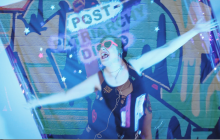-
12Nov2012
- comments:
- 0
- share:
The Real Ladykillers
My song, ‘Ladykillers’, will be released on 10 December, which is International Human Rights Day, and also marks the end of the annual Sixteen Days of Activism Against Gender Violence.
The song is about ladykillers in the usual sense of the word – womanisers, men who objectify, take advantage of and exploit women. But it is also about ladykillers in a much more literal sense.
“If you’re not above cheating, if you’re not above beating…”
Home Office statistics show that two women are killed every week in the UK by a current or former partner. In 2012, 89 UK women have been killed in suspected gender-related murders – that’s one every 3.4 days.
UK police receive a call about domestic abuse once every 60 seconds, and 1 in 4 women in the UK experience domestic violence at some point in their lives. Worldwide, the figure could be up to 40%.
Of course, men also experience gender-based violence, but women are far more likely to experience it than men, and far more likely to be injured or killed. Women from marginalised groups such as young women, women with disabilities and LGBTQ women are especially at risk.
“When he’s got you pinned to the bed becoming a part of the one in three…”
The British Crime Survey shows that more than 300,000 women are sexually assaulted and 60,000 raped in the UK each year, yet fewer than 1 in 10 women who experience serious sexual assault report it to the police. Of all rape cases reported to the police, only 6% result in a conviction. While women who report rape and sexual assault are frequently branded liars, there is no evidence that false accusations are higher than for any other crime.
When most people think of rape, they probably think of women being attacked on a dark night by a stranger in an alleyway (or “classic rape”, as our very own Justice Secretary Ken Clarke once described it). In reality, women are far more likely to be raped or sexually assaulted by their husband or partner than by a stranger.
Globally, depending on which figures you look at, 1 in 3 women will be raped or sexually abused in their lifetime, which is where the “one in three” line in Ladykillers comes from. It is notoriously difficult to find accurate data on this, as reporting of these crimes is very low and many countries do not even collect these numbers.
What can you do to help end sexual and gender-based violence?
There are many things you can do to help stop domestic abuse, rape and sexual assault.
You can donate to or volunteer for charities such as End Violence Against Women, Rape Crisis, Refuge and Women’s Aid which provide vital services for survivors and campaign to increase prosecutions and end rape culture.
You can support international campaigns such as the UN’s UNiTE to End Violence Against Women campaign.
Perhaps most importantly, we all need to challenge the trivialisation of violence against women in our everyday lives. Domestic abuse and sexual violence should never be a punchline. We must all be willing to call out people who treat violence against women as a joke, who blame the victims for their abuse or who spread rape myths.
A culture that tolerates and trivialises violent crimes and asks the victims to stay silent about them, accept the blame for them or even laugh about them is not a culture that I want to live in. If you don’t either, then please stand up against it in any way you can.
If you are experiencing domestic abuse or have experienced sexual assault or rape and are looking for help, the following organisations may be able to assist:
Rape Crisis: 0808 802 9999 / http://www.rapecrisis.org.uk/gettinghelp2.php
National Domestic Violence Helpline: 0808 2000 247 / http://refuge.org.uk/get-help-now/





No Comments